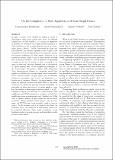| dc.contributor.author | Daskalakis, Constantinos | |
| dc.contributor.author | Schoenebeck, Grant | |
| dc.contributor.author | Valiant, Gregory | |
| dc.contributor.author | Valiant, Paul | |
| dc.date.accessioned | 2012-10-16T14:20:28Z | |
| dc.date.available | 2012-10-16T14:20:28Z | |
| dc.date.issued | 2009 | |
| dc.identifier.uri | http://hdl.handle.net/1721.1/74013 | |
| dc.description.abstract | In light of much recent interest in finding a model of multi-player multi-action games that allows for efficient computation of Nash equilibria yet remains as expressive as possible, we investigate the computational complexity of Nash equilibria in the recently proposed model of action-graph games (AGGs). AGGs, introduced by Bhat and Leyton-Brown, are succinct representations of games that encapsulate both local dependencies as in graphical games, and partial indifference to other agents' identities as in anonymous games, which occur in many natural settings such as financial markets. This is achieved by specifying a graph on the set of actions, so that the payoff of an agent for selecting a strategy depends only on the number of agents playing each of the neighboring strategies in the action graph. We present a simple Fully Polynomial Time Approximation Scheme for computing mixed Nash equilibria of AGGs with constant degree, constant treewidth and a constant number of agent types (but an arbitrary number of strategies), and extend this algorithm to a broader set of instances. However, the main results of this paper are negative, showing that when either of the latter conditions are relaxed the problem becomes intractable. In particular, we show that even if the action graph is a tree but the number of agent-types is unconstrained, it is NP- complete to decide the existence of a pure-strategy Nash equilibrium and PPAD-complete to compute a mixed Nash equilibrium (even an approximate one). Similarly for AGGs with a constant number of agent types but unconstrained treewidth. These hardness results suggest that, in some sense, our FPTAS is as strong a positive result as one can expect. In the broader context of trying to pin down the boundary where the equilibria of multi-player games can be computed efficiently, these results complement recent hardness results for graphical games and algorithmic results for anonymous games. | en_US |
| dc.description.sponsorship | National Science Foundation (U.S.) (Grant 6916481) | en_US |
| dc.language.iso | en_US | |
| dc.publisher | Society for Industrial and Applied Mathematics | en_US |
| dc.relation.isversionof | http://dl.acm.org/citation.cfm?id=1496848 | en_US |
| dc.rights | Article is made available in accordance with the publisher's policy and may be subject to US copyright law. Please refer to the publisher's site for terms of use. | en_US |
| dc.source | SIAM | en_US |
| dc.title | On the complexity of Nash equilibria of action-graph games | en_US |
| dc.type | Article | en_US |
| dc.identifier.citation | Constantinos Daskalakis, Grant Schoenebeck, Gregory Valiant, and Paul Valiant. 2009. On the complexity of Nash equilibria of action-graph games. In Proceedings of the twentieth Annual ACM-SIAM Symposium on Discrete Algorithms (SODA '09). Society for Industrial and Applied Mathematics, Philadelphia, PA, USA, 710-719. | en_US |
| dc.contributor.department | Massachusetts Institute of Technology. Department of Electrical Engineering and Computer Science | |
| dc.contributor.mitauthor | Valiant, Paul | |
| dc.relation.journal | Proceedings of the twentieth Annual ACM-SIAM Symposium on Discrete Algorithms (SODA '09) | en_US |
| dc.eprint.version | Final published version | en_US |
| dc.type.uri | http://purl.org/eprint/type/ConferencePaper | en_US |
| mit.license | PUBLISHER_POLICY | en_US |
| mit.metadata.status | Complete | |
